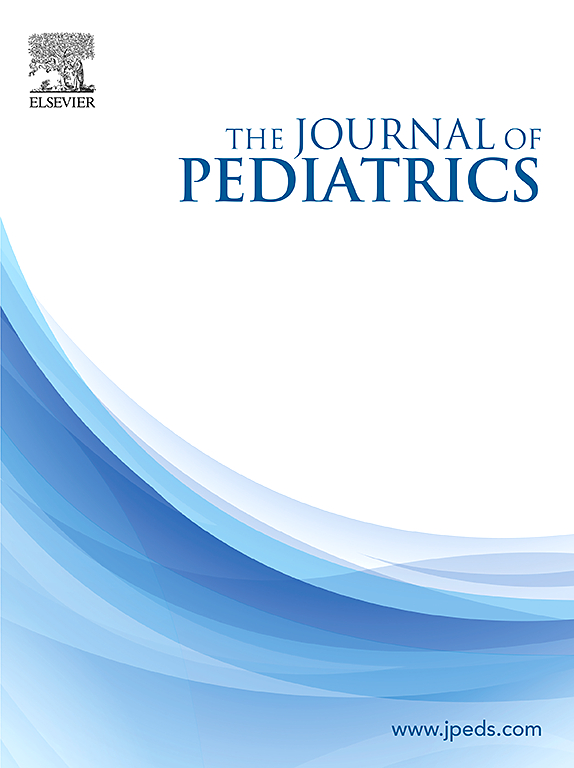阿托品与安慰剂用于新生儿非紧急插管:一项随机临床试验。
IF 3.5
2区 医学
Q1 PEDIATRICS
引用次数: 0
摘要
目的:比较气管插管前接受阿托品-芬太尼-琥珀酰胆碱组(阿托品/标准护理组)与安慰剂-芬太尼-琥珀酰胆碱组(安慰剂/干预组)新生儿重度心动过缓(10秒)的发生率。研究设计:一项针对接受非紧急插管的新生儿的多中心、双盲、随机临床试验。随机化采用计算机生成的随机块大小表,随机化时按PMA(10秒)、插管次数和持续时间以及低氧血症(10秒)分层。安全性结果包括深度心动过缓(10秒)和接受胸部按压或肾上腺素治疗。通过意向治疗进行分析。结果:73例插管事件(60例婴儿)被随机分配给阿托品(n=24)或安慰剂(n=49)。33%的事件发生了多次尝试。两组均未发生安全事件。与阿托品组相比,安慰剂组在整个治疗过程中出现了严重的心动过缓;Rr 6.3 (95% ci 1.2 - 34.1)。与阿托品组相比,安慰剂组总体心动过缓的发生率和持续时间明显较高,但低氧血症的发生率和持续时间较低,可能与多次尝试的比例较低(27%对46%,p 0.09)和插管成功时间较长(394对283秒,p 0.08)有关。结论:在接受非紧急插管治疗前的新生儿中,与安慰剂相比,阿托品显著降低了严重和全面心动过缓的发生率和持续时间。本文章由计算机程序翻译,如有差异,请以英文原文为准。
Atropine Versus Placebo for Neonatal Nonemergent Intubation: A Randomized Clinical Trial
Objective
To compare the rates of severe bradycardia (<80/min for >10 seconds) between neonates who received atropine-fentanyl-succinylcholine (atropine/standard-of-care group) vs placebo-fentanyl-succinylcholine (placebo/intervention group) before orotracheal intubation.
Study design
A multicenter, double-blind, randomized clinical trial of neonates receiving nonemergent intubation. Randomization was by computer generated tables with random block size, stratified by postmenstrual age at randomization (<34 weeks and ≥34 weeks). The primary outcome was severe bradycardia during the whole procedure (from administration of the study medication until completion of last successful intubation). Secondary outcomes included any bradycardia (<100/min for >10 seconds), number and duration of intubation attempts and hypoxemia (<80% for >10 seconds). Safety outcomes included profound bradycardia (<60/min for >10 seconds), and receipt of chest compression or epinephrine. Analysis was by intention to treat.
Results
Seventy-three intubation events (60 infants) were randomized to administration of atropine (n = 24) or placebo (n = 49). Multiple attempts occurred in 33% of the events. No safety events occurred in either group. Severe bradycardia during the whole procedure was significantly higher in the placebo group compared with the atropine group (RR, 6.3; 95% CI, 1.2-34.1). The placebo group had significantly higher rates and duration of overall bradycardia, but lower rates and duration of hypoxemia compared with the atropine group, probably related to the lower proportion of multiple attempts (27% vs 46%; P = .09) and longer time to successful intubation (394 seconds vs 283 seconds; P = .08).
Conclusions
Among neonates receiving premedication for nonemergent intubation, atropine significantly decreased the rates and duration of severe and overall bradycardia compared with placebo.
Trial registration
ClinicalTrials.gov: NCT01595399 (https://clinicaltrials.gov/study/NCT01595399).
求助全文
通过发布文献求助,成功后即可免费获取论文全文。
去求助
来源期刊

Journal of Pediatrics
医学-小儿科
CiteScore
6.00
自引率
2.00%
发文量
696
审稿时长
31 days
期刊介绍:
The Journal of Pediatrics is an international peer-reviewed journal that advances pediatric research and serves as a practical guide for pediatricians who manage health and diagnose and treat disorders in infants, children, and adolescents. The Journal publishes original work based on standards of excellence and expert review. The Journal seeks to publish high quality original articles that are immediately applicable to practice (basic science, translational research, evidence-based medicine), brief clinical and laboratory case reports, medical progress, expert commentary, grand rounds, insightful editorials, “classic” physical examinations, and novel insights into clinical and academic pediatric medicine related to every aspect of child health. Published monthly since 1932, The Journal of Pediatrics continues to promote the latest developments in pediatric medicine, child health, policy, and advocacy.
Topics covered in The Journal of Pediatrics include, but are not limited to:
General Pediatrics
Pediatric Subspecialties
Adolescent Medicine
Allergy and Immunology
Cardiology
Critical Care Medicine
Developmental-Behavioral Medicine
Endocrinology
Gastroenterology
Hematology-Oncology
Infectious Diseases
Neonatal-Perinatal Medicine
Nephrology
Neurology
Emergency Medicine
Pulmonology
Rheumatology
Genetics
Ethics
Health Service Research
Pediatric Hospitalist Medicine.
 求助内容:
求助内容: 应助结果提醒方式:
应助结果提醒方式:


